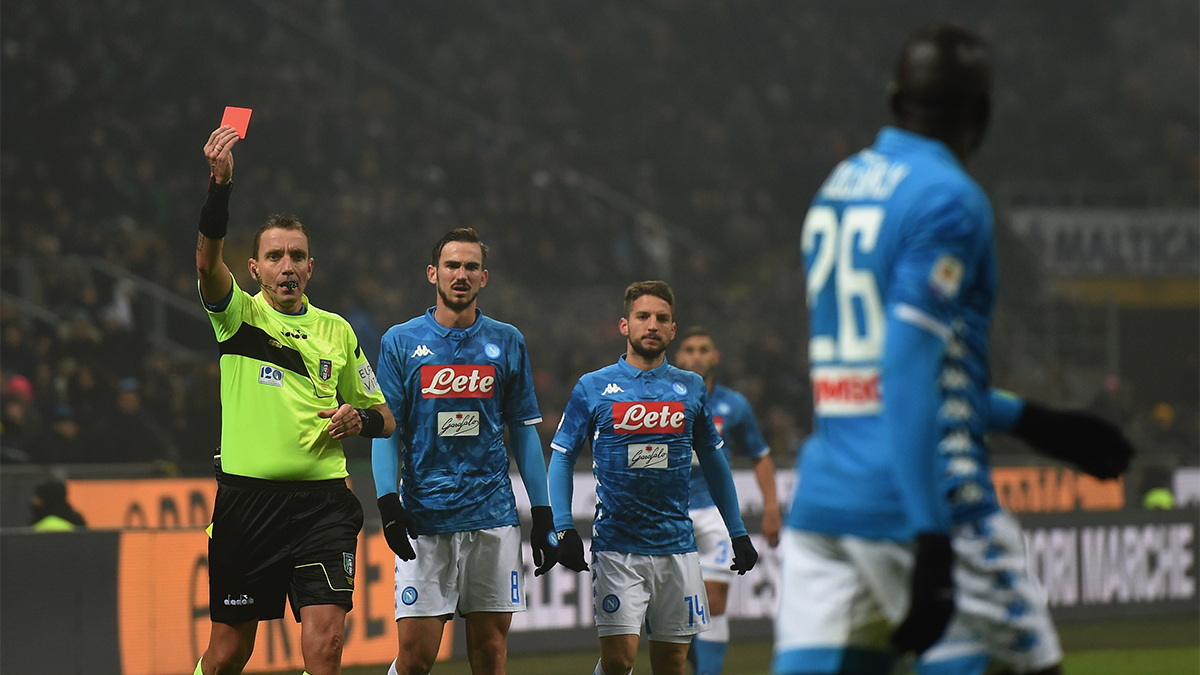Racism continues to taint European football

The rise of racist incidents in European football shows no sign of abating despite efforts by teams, leagues and social organizations to abolish it.

Napoli Senegalese centre back Kalidou Koulibaly can attest to this. He has been targeted multiple times by fans simply because of his skin color, most notably in 2016 and 2018.
In a 2016 game against Lazio, Koulibaly was subjected to isolated boos and “ugly chants” from specific sections of the crowd every time the Senegal international touched the ball, forcing the game to be stopped by referee Massimiliano Irrati for three minutes. That led to a $56,000 fine and multiple closed sections of the bleachers for Lazio’s next two home games.
The 2018 matchup against Inter Milan took a disgraceful turn while Koulibaly was being assessed a red card. He was met with monkey chants until his departure from the field. The referee did not stop the game after the racial chants began and the slightly different penalty that forced Inter Milan to play their next two games behind closed doors and closed-off sections of the stadium for the following game.
After that incident, the Italian FA (FIGC) changed its anti-racism procedures, giving referees the ability to take both teams off the field after just a single announcement.
While referees still have no power to abandon the game itself under these procedures, the added changes push the referee to halt the match when racism incidents begin, which the referee in the case of Koulibaly’s most recent incident chose not to do and was later criticized for the protocol lapse.
With the problem gaining more traction as a result of the efforts by Kick It Out, an English equality and inclusion organization focused on global football. The group reported that for a sixth straight year reports of racial incidents continued to increase.
- “Racism constituted 53 percent of total reports during the 2017-18 season, a rise of 22 percent from the previous year.”
- “The charity received a total of 520 reports for this period, up by 11 percent from 469 in 2016-17.”
- “Grassroots discrimination reports rose by 35 per cent across the same period, with racism (71 percent) and disability (33 percent) the most common forms of discrimination reported.”
After this report was released, players began coming forward with their own stories. Manchester City forward Raheem Sterling led the way after he was subjected to ‘racial epithets’ from the Chelsea headhunters, a once notorious hooligan element attached to the club in the 70s that has ties to the UK National front, a far-right party, and the neo-Nazi group Combat 18.
For Sterling, the problem is deeper than just the fandom. He also expressed the media bias he has been subject to during his career in an Instagram post.
Manchester City captain Vincent Kompany put the situation in perspective for Sterling.
“Vinnie made a really good point,” Sterling said. “He said it’s not the fault of the people writing the stories: It is because there are not enough black and minority ethnic people in high office in the media.
That reality exposes a deeper issue within England.
“Representation of employees from minority ethnic backgrounds has improved slightly across the industry from 11 to 13 percent, but at senior management level there has been no improvement year on year,” according to an Ofcom diversity and equal opportunities in television 2018 study.
Italy’s Observatory on Racism and Anti-Racism in Football (IORARF) research shows between 2000-2013 an estimated 660 racial incidents were reported, with about $5 million in fines handed out over the same period.
“In Italy, no club has a real anti-racist strategy, because it believes the fight against racism is not a priority,” said Mauro Valeri, head of the IORARF.
Sadly not much has been done to halt these incidents in terms of regulation, and incidents have spread into European football leagues.
Part of the problem’s longevity is multi-dimensional. The terms spectator disorderliness and football hooliganism are two similar ways in which the spectator violence in the game itself is categorized. The difference rests in being acts of adult deviancy and youthful deviancy.
When it comes to what is reported, youthful deviance will capture the majority of attention because of the association with ultras while adult deviancy is the label associated with the casual fan because their origins lie in the excitement generated by the match itself.
Ultras are a group of hardcore fans who usually espouse nationalistic views.
Their name reflects its hardcore fans but they are defined under ‘youthful deviancy’ helping explain the difference between the level of reporting that was actually done in its early years.
As this level of fandom became more common at games in European football leagues, this culture integrated over time leading new generations to follow with few reasons to justify the practice itself.
The ideology of the Neo-Nazi/Neo-Fascists was the cause for concern with Ultras groups six years ago; the monkey chants and racial stereotyping have been the staples for these groups over time. They dated to the 1980s, when belittling chants aimed at black athletes became increasingly common.
These incidents and who they involve point to the overall problem within the culture behind European football and the changes the game should turn to.
The players have made their feelings and intentions known, but given the state of European football not much power resides with the players but the effort has been made by groups like Inter to voice the urgency,
To the surprise of those not familiar with the cultural views of fans and authority in the European football world, the purposes and goals of these groups are often undermined by the people around them.
Weeks after the second Koulibaly incident, Italian government minister Matteo Salvini voiced how he felt about the Italian Football Federation’s announcement of its desire to shorten and simplify procedures for suspensions for racism incidents:
''Suspending matches for offensive chants is a slippery slope,'' Salvini said. ''We risk putting the destiny of a lot of people in the hands of very few. ... Plus, it's difficult to find fair criteria for the decision.''
That doesn’t mean nothing has been done to try and combat racism. In 2018, Kick It Out and Forza Football took a survey of more than 27,000 European football fans across 38 countries on the idea of deducting points for teams as the result of fans being convicted of racism at games.
Among the 60 percent that answered in favor of the idea, 54 percent of those said they had witnessed racist abuse while watching a game. But only about 28 percent of fans know how to properly report these incidents.
"The governing bodies, including The FA, UEFA and FIFA, must do more to promote methods of reporting racism, and they must listen to supporters' demands," said Lord Ouseley, chairman of Kick It Out.
But with no current plan for implementing penalties for racial abuse, players are still subject to it from fans.
West Ham United Forward Michail Antonio voiced his want for point reductions after Liverpool’s Mohamed Salah was a recent target of racial slurs directed at him by West Ham supporters.
**Video contains obscene language, viewer discretion advised
“If you start playing games behind closed doors and deducting points, then the problem is inside themselves, they're going to deal with it themselves. If you affect their team, the fans, his friends, are going to turn on him" Antonio told Sky Sports.
Trej Bell is a junior sports journalism major at Arizona State University
Related Articles
German police investigating reports of racist comments at Germany match
West Ham faces call to condemn Democratic Football Lads Alliance
If you haven't experienced racism, it's very difficult to understand it

